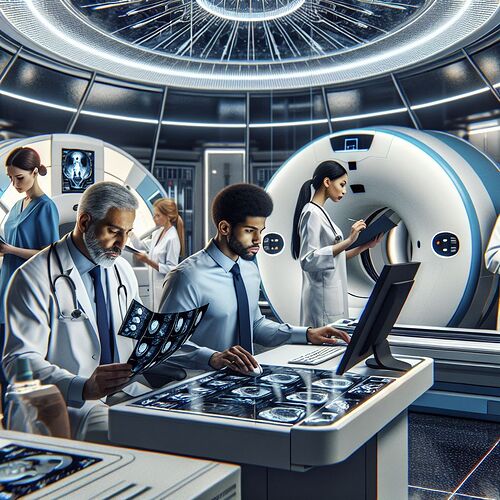Medical imaging technology is a vital component of the healthcare industry. It involves the use of various imaging modalities to visualize the interior of a body for clinical analysis and medical intervention.
If you are interested in a career that requires proficiency in medical imaging technology, there are several options to consider:
1. Radiologic Technologist
Radiologic technologists, also known as radiographers, are healthcare professionals who specialize in performing diagnostic imaging examinations, such as X-rays, MRI scans, and CT scans.
Example:
A radiologic technologist might perform a chest X-ray to help diagnose a patient's respiratory condition.
2. MRI Technologist
An MRI technologist operates magnetic resonance imaging (MRI) scanners to create detailed images of organs and tissues in the body.
Example:
An MRI technologist might conduct an MRI scan to help detect abnormalities in a patient's brain.
3. Ultrasound Technician
Ultrasound technicians, also known as diagnostic medical sonographers, use ultrasound equipment to capture images of the internal structures of the body.
Example:
An ultrasound technician might perform a prenatal ultrasound to monitor the development of a fetus.
4. Nuclear Medicine Technologist
Nuclear medicine technologists prepare and administer radioactive drugs to patients and use imaging equipment to visualize the distribution of these drugs in the body.
Example:
A nuclear medicine technologist might perform a PET scan to assess the spread of cancer in a patient's body.
5. Radiation Therapist
Radiation therapists are responsible for administering radiation treatments to patients with cancer and other diseases.
Example:
A radiation therapist might deliver targeted radiation therapy to shrink a tumor in a cancer patient.
6. Cardiovascular Technologist
Cardiovascular technologists specialize in imaging the heart and blood vessels to assist with the diagnosis and treatment of cardiovascular conditions.
Example:
A cardiovascular technologist might perform an echocardiogram to evaluate the function of a patient's heart.
7. Medical Physicist
Medical physicists work in the field of radiation oncology, diagnostic radiology, and nuclear medicine, ensuring the safety and effectiveness of imaging equipment and procedures.
Example:
A medical physicist might calibrate radiation therapy equipment to ensure precise dosage delivery to patients.
Each of these careers requires specialized training and certification, but they all play a crucial role in the diagnosis and treatment of medical conditions. If you have an interest in technology and healthcare, a career in medical imaging technology might be the perfect fit for you.
Did I miss anything? Add your comments below!
